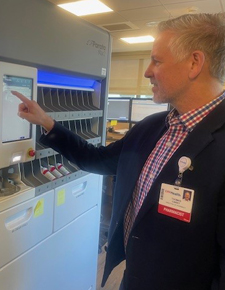UW Health
Serving a High-Need Population of Patients
Since 2020, hospitals have faced increasing labor and supply costs while seeing more patients with Medicaid coverage than private insurance. During the same time, pharmaceutical companies began placing restrictions on hospitals participating in the federal 340B drug discount program. Those restrictions, including limiting contracts to a single pharmacy, have significantly reduced the drug cost savings hospitals invest in expanding access to care and offering more comprehensive services.
For UW Health, the 340B program that began in 1992 has been a critical component in maintaining the financial viability of its four Illinois hospitals: Belvidere Hospital in Belvidere, SwedishAmerican Hospital in Rockford, Women’s and Children’s Hospital in Rockford, and Heart Hospital in Rockford. Over 22% of Rockford residents and nearly 16% of Belvidere residents live in poverty. Per capita income in both cities was about $30,000 between 2019 and 2023.
 Over 68% of the hospitals’ patients have government coverage through Medicaid and Medicare, lack insurance, or are offered charity care because they don’t have the means to pay.
Over 68% of the hospitals’ patients have government coverage through Medicaid and Medicare, lack insurance, or are offered charity care because they don’t have the means to pay.
“340B is critical to sustaining a positive operating margin to provide access to our patient care,” UW Health said. “Even with 340B we operate most years on a less than 1% budgeted operating margin.”
Between 2019 and 2024, Wisconsin-based UW Health’s Illinois hospitals have saved nearly $167 million in drug costs, which it put into serving a high-need population of patients. Because of new drugmaker limitations, UW Health stands to lose $3.5 million annually just in Illinois, a 10% reduction and money that would be used to support patients.
With 340B savings, UW Health’s Illinois hospitals have:
-
Saved patients almost $4,000 in prescription costs in just six months through the UWNI Outpatient Pharmacy Program, which subsidizes out-of-pocket costs for patients unable to pay for their take-home prescriptions at discharge;
-
Invested $250,000 in hiring pharmacists who completed over 8,800 patient consultations to optimize medications and lower out-of-pocket costs;
-
Provided 13,475 no-cost prescriptions to over 3,700 patients at the time of discharge in fiscal year 2023 to ensure access to critically needed medications; and
-
Provided almost $90,000 of oncology medications to seven patients who could not afford their treatment, through the I-DROP Program that receives donated high-cost medications.
UW Health also dedicates resources to a 340B program team, whose core members include full-time pharmacy leaders and business operations specialists that review claims across the health system to prevent 340B drug diversion and duplicate discounts. The system’s 340B Oversight Committee meets monthly to establish standards, integrate departments and make system-wide decisions on ensuring 340B program integrity. UW Health contracts with 340B experts to perform external audits, ensuring program compliance and operational integrity.

